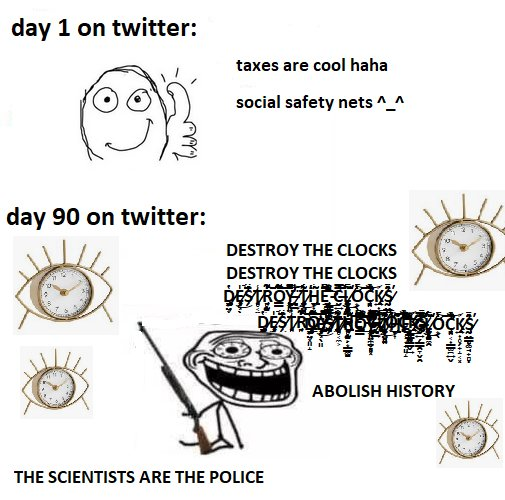Don't @ Me
Attention conservation notice: Rationalizing my gut-level dislike of a social medium as Objectively Correct. First drafted in mid-2017, left to rest in my drafts folder because, while sincere, it feels a bit mean. Posted now because I found myself re-writing the next-to-last paragraph.
If, as Leibniz has prophesied, libraries one day become cities, there will still be dark and dismal streets and alleyways as there are now. --- LichtenbergI mentioned, some years ago, that in response to reader requests I have a Twitter account. I use this only for announcing new posts here. Messages sent to it will go unread; attempts to communicate through it will be fruitless.
I have, nonetheless, put some time over the years into observing Twitter; I wish I had it back again. There are, so far I can see, only four good uses for Twitter:
- Announcements of actual, substantive posts, resources or discussions elsewhere. (But we have e-mail and RSS already.)
- Announcing off-line events, details given elsewhere.
- Snapshots of cute animals, pretty landscapes, children's birthday parties, and the like.
- Jokes.
For everything else, well, if someone had deliberately tried to combine the worst features of comments sections and Usenet, they could hardly have done better --- except by first imposing silly length restrictions, followed by kludged-on threads that make Usenet seem a model of clear organization, plus of course an interface that channels people towards the outrage (or main character) of the moment.

I don't know whether it makes people unhappy and angry, or whether only unhappy, angry people persist in using it, but I am not joking when I say that we would all be better off if it disappeared immediately.

--- One of my long-held semi-crank notions is this: all online communication, being through writing, reproduces the social dynamics of literary communities, especially print-literary communities. This law holds independent of the educational level or even intellectual seriousness of the participants. Thus flame-wars, sock-puppets, selective quotation, trawling through the archive for discreditable episodes, "the lurkers support me in e-mail", creating isolated fora to incubate increasingly weird ideas, recycling from supposedly-authoritative source texts long after they're debunked (if they were ever bunked in the first place), spastic attention cascades in which "all fandom was plunged into war", etc., escape from the pages of the little magazines (such as the Philosophical Transactions of the Royal Society), to become part of everyone's life. Twitter has raised this to a new level of awfulness, by making it very hard to actually contribute anything of value, or, having done so, for others to find it and build on it, while still preserving the affordances for weirdness, meanness, and spasm-proneness.
That is my opinion; and it is further my opinion that you people should get off my lawn.
Update, 28 May 2022, further to the theme, in no particular order:
- C. Thi Nguyen, "Twitter, the Intimacy Machine"
- A. A. Forst, "The Poisoned Chalice of Hashtag", Catalyst 4:2 (Summer 2020) (*)
- Chris Hayes, "On the Internet, We're Always Famous", The New Yorker 24 September 2021
- Fonda Lee, "Twitter Is the Worst Reader"
- Momin Malik, Bias and Beyond in Digital Trace Data, Ph.D. Thesis, Carnegie Mellon University, 2018
*: Some comments on Frost's review, without having read the book being reviewed. (1) I am, unsurprisingly, extremely sympathetic to the position that hashtag activism is basically futile. (If the authors really neglect Tufekci's empirical and theoretical work as much as Frost says they do, it's pretty damning.) (2) Not examining right-wing hashtag activism seems like an obvious analytical flaw. (Even if your primary interest is in left-wing movements, the comparisons are essential.) (3) It's true that Twitter isn't accountable to its users, or to the people-as-represented-by-government, but Frost for her part never makes clear which of the flaws she identifies would be remedied by such accountability. (4) Doing something about the opioid epidemic by tinkering with drug policy seems a hell of a lot more practical to me that doing something about it by overthrowing American capitalism, or even reversing the trends in inequality over the last half-century. (I would like to see those trends reversed.) ^
Actually, "Dr. Internet" Is the Name of the Monsters' Creator; Linkage; Modest Proposals; The Collective Use and Evolution of Concepts
Posted at May 28, 2022 12:56 | permanent link